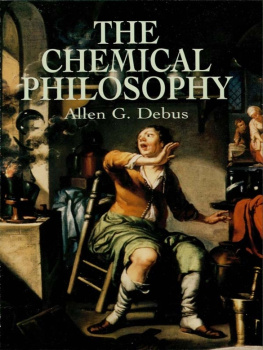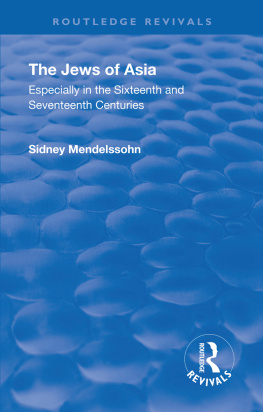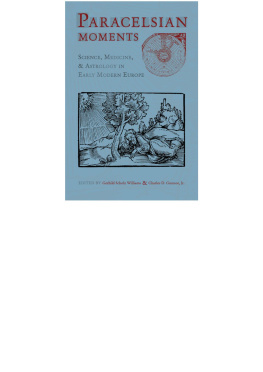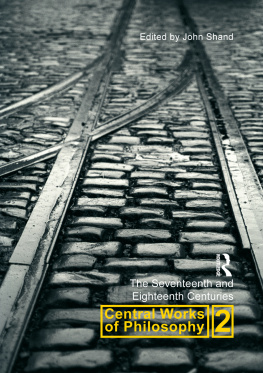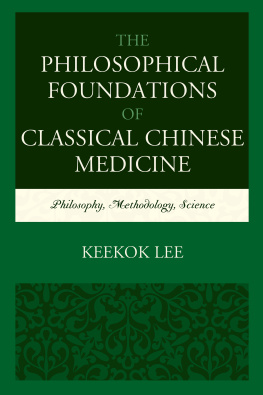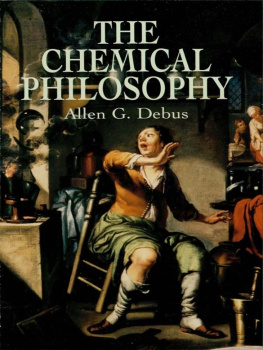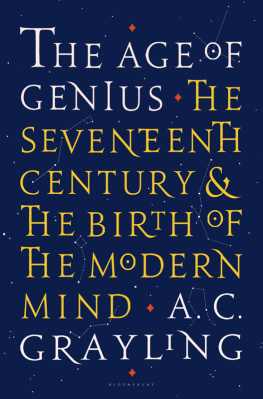Debus - The chemical philosophy: Paracelsian science and medicine in the sixteenth and seventeenth centuries
Here you can read online Debus - The chemical philosophy: Paracelsian science and medicine in the sixteenth and seventeenth centuries full text of the book (entire story) in english for free. Download pdf and epub, get meaning, cover and reviews about this ebook. City: Mineola;N.Y, year: 2002;2012, publisher: Dover Publications, genre: Art. Description of the work, (preface) as well as reviews are available. Best literature library LitArk.com created for fans of good reading and offers a wide selection of genres:
Romance novel
Science fiction
Adventure
Detective
Science
History
Home and family
Prose
Art
Politics
Computer
Non-fiction
Religion
Business
Children
Humor
Choose a favorite category and find really read worthwhile books. Enjoy immersion in the world of imagination, feel the emotions of the characters or learn something new for yourself, make an fascinating discovery.
The chemical philosophy: Paracelsian science and medicine in the sixteenth and seventeenth centuries: summary, description and annotation
We offer to read an annotation, description, summary or preface (depends on what the author of the book "The chemical philosophy: Paracelsian science and medicine in the sixteenth and seventeenth centuries" wrote himself). If you haven't found the necessary information about the book — write in the comments, we will try to find it.
Debus: author's other books
Who wrote The chemical philosophy: Paracelsian science and medicine in the sixteenth and seventeenth centuries? Find out the surname, the name of the author of the book and a list of all author's works by series.
The chemical philosophy: Paracelsian science and medicine in the sixteenth and seventeenth centuries — read online for free the complete book (whole text) full work
Below is the text of the book, divided by pages. System saving the place of the last page read, allows you to conveniently read the book "The chemical philosophy: Paracelsian science and medicine in the sixteenth and seventeenth centuries" online for free, without having to search again every time where you left off. Put a bookmark, and you can go to the page where you finished reading at any time.
Font size:
Interval:
Bookmark:
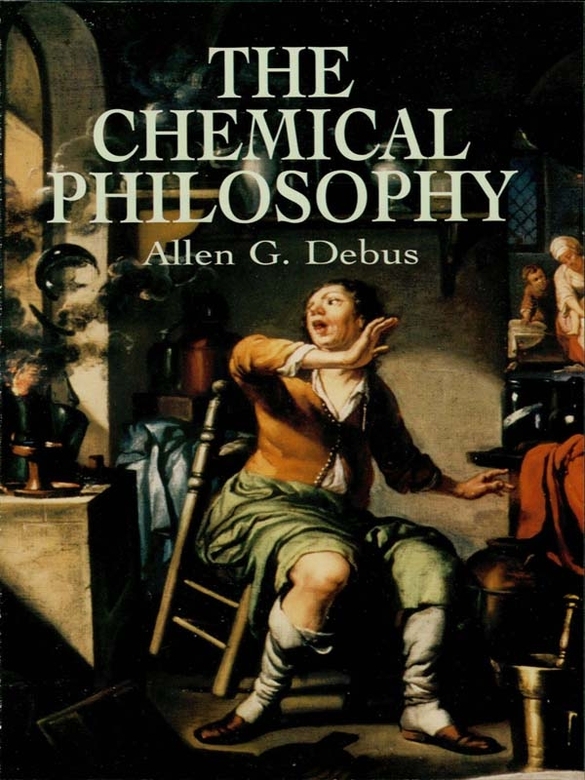
THIS BIBLIOGRAPHY has been arranged alphabetically by primary and secondary sources and then chronologically when an author is represented by more than one work. As mentioned earlier, no attempt has been made to list all sixteenth- and seventeenth-century texts in this field; only those that have actually been consulted will be found here. It should also be noted that a number of English translations have been cited. The present research originated with a paper on the English Paracelsians prepared for Professor W.K. Jordans seminar on Tudor England at Harvard University in 1956. In the course of that work the author soon became aware of the rich, and largely untapped, mine of sixteenth-and seventeenth-century translations of continental chemical and medical works. These early translations are delightful to readfar more so than modern renditions. Thus, although many new translations have been made for this book, early versions are quoted whenever possible.
It seems unnecessary to comment on all of the translations listed in the bibliography. A few examples may suffice. As one would expect, there are real problems in using such works, since the translators were not all of the same caliber. There are, indeed, some very poor translations. Paracelsus and the alchemists have excited the interest of occultists for a long period of time, and translations made by such enthusiasts are to be used with caution. A prime example is the French translation of the Medicina spagrica tripartita (1648) of Johannes Pharamundus Rhumelius [Mdecine spagyrique (1648), trans. Pierre Rabbe *(Paris: Bibliothque Chacornac, 1932)]. The work is highly condensed, and through the elimination of essential words and phrases the translator has actually altered the meaning of the original text. This twentieth-century effort may be compared with the rather remarkable translation of Daniel Sennerts De chymicorum cum Aristotelicis et Galenicis consensu ac dissensu liber (1619) made by Nicholas Culpeper and Abdiah Cole [Chymistry Made Easie and Useful, Or, The Agreement and Disagreement of the Chymists and Galenists (London: Peter Cole, 1662)]. In this case key sentences have been translated in their entirety, and generally with considerable accuracy. But if long passages are missing, the finished work still maintains the thrust of Sennerts argument and leads the reader accurately and swiftly to the subjects of interest in the Latin original.
A final example is John Chandlers translation of van Helmonts Ortus medicinae and Opuscula (1648; English translation, 1662). Here we have the case of the translation of the opera omnia of a major author. Chandlers work has been frequently attacked for its cumbersome English and the use of words which today might be misinterpreted. Although specific cases can be raised to support this view, the same charges could be levelled against most of the works originally written in English from that period. In any case, it would be unfortunate if such criticism resulted in the neglect of Chandlers work, for it is surely a most useful one. Chandler was successful in preserving van Helmonts general meaning, and his translation may be used with relative safety in its nontechnical sections. Even in the more technical chapters the version offered is frequently acceptable. And if Chandlers translation may be faulted for not being entirely accurate, it remains significant for vividly preserving the flavor of seventeenth-century science and medicine.
Little need be said about the secondary sources. An attempt has been made to use all recent studies of value. Still, it seems inevitable that some published research will be overlooked and that other papers and books will be found too late for their effective use. I was fortunate in being able to work from the galley proofs of Walter Pagels Van Helmonts Concept of DiseaseTo Be or Not To Be? The Influence of Paracelsus [Bulletin of the History of Medicine, 46 (1972), 419-454], but other important works bearing on problems discussed in these pages appeared in print later. Among these may be cited Owsei Temkins Galenism: Rise and Decline of a Medical Philosophy (Ithaca/London: Cornell University Press, 1973), Charles B. Schmitts Toward a Reassessment of Renaissance Aristotelianism [History of Science, 9 (1973), 159-193], and Audrey B. Davis Circulation Physiology and Medical Chemistry in England 1650-1680 (Lawrence, Kansas: Coronado Press, 1973).
In the final stagesafter most of the type for this volume had been setthere appeared several new studies that would have been discussed in the text had they appeared earlier. Among these are two parts of Joseph Needhams long-awaited volume on chemistry: Science and Civilisation in China, Volume V: Chemistry and Chemical Technology, Part II, Spagyrical Discovery and Invention: Magisteries of Gold and Immortality (with Lu Gwei-Djen) (Cambridge : Cambridge University Press, 1974); and Part III, Spagyrical Discovery and Invention: Historical Survey, from Cinnabar Elixirs to Synthetic Insulin (with Ho Ping-Y and Lu Gwei-Djen) (Cambridge : Cambridge University Press, 1976). In another new work Owen Hannaway has explored the conflicting opinions of Andreas Libavius and Oswald Crollius in his The Chemists and the Word. The Didactic Origins of Chemistry (Baltimore: Johns Hopkins Press, 1975). My thoughts on this work have just appeared in a review, Paracelsians and Pragmatists, Times Literary Supplement, June 18, 1976, p. 746. And finally, Betty Jo Teeter Dobbs has presented the results of her study of Isaac Newtons alchemical manuscripts in The Foundations of Newtons Alchemy or The Hunting of the Green Lyon (Cambridge: Cambridge University Press, 1976). In the case of this work my reflections are to be found in a review that is yet to be printed in Centaurus. Although other recent titles might well have been mentioned, these are representative of the ever-increasing volume of truly important research in this area of Renaissance science and medicine.
Acadmie Royale des Sciences, Paris. Histoire de lAcadmie Royale des Sciences depuis son tablissement en 1666 jusqua 1686. Paris: Martin, Coignard and Guerin, 1733.
Agricola, Georgius. De re metallica. Trans. H. C. and L. H. Hoover. 1912. Reprint New York: Dover, 1950.
. De natura eorum quae effluunt ex terra libri IV. 1545. In Schriften zur Geologie und Minerologie (from the Ausgewhlte Werke, ed. Hans Prescher. Berlin: VEB Deutscher Verlag der Wissenschaften, 1956).
Agrippa, Henry Cornelius. De occulta philosophia. Libri tres. [Cologne]: J. Seter, 1533.
. Three Books of Occult Philosophy or Magic. Book One Natural Magic .... Ed. Willis F. Whitehead. 1897. London: Aquarian Press, 1971.
Albertus Magnus. Book of Minerals. Trans. Dorothy Wyckoff. Oxford: Clarendon Press, 1967.
Andreae, Johann Valentin. Christianopolis. An Ideal State of the Seventeenth Century. Trans. with an historical introduction by Felix Emil Held. New York: Oxford University Press 1916.
Anthony, Francis. Medicinae chymiae, et veri potabilis auri assertio. Cambridge: C. Legge, 1610.
. Apologia veritatis illucescentis pro auro potabile. London: J. Legatt, 1616.
. The Apologie, or, defence of a verity heretofore published concerning a medicine called Aurum Potabile. London: J. Legatt, 1616.
Aristotle. The Metaphysics. Books I-IX. Trans. Hugh Tredennick. London: Heinemann; New York: Putnams, 1933.
. Metaphysics. Newly translated as a postscript to natural science with an analytical index of technical terms. Trans. Richard Hope. New York: Columbia University Press, 1952.
Font size:
Interval:
Bookmark:
Similar books «The chemical philosophy: Paracelsian science and medicine in the sixteenth and seventeenth centuries»
Look at similar books to The chemical philosophy: Paracelsian science and medicine in the sixteenth and seventeenth centuries. We have selected literature similar in name and meaning in the hope of providing readers with more options to find new, interesting, not yet read works.
Discussion, reviews of the book The chemical philosophy: Paracelsian science and medicine in the sixteenth and seventeenth centuries and just readers' own opinions. Leave your comments, write what you think about the work, its meaning or the main characters. Specify what exactly you liked and what you didn't like, and why you think so.

